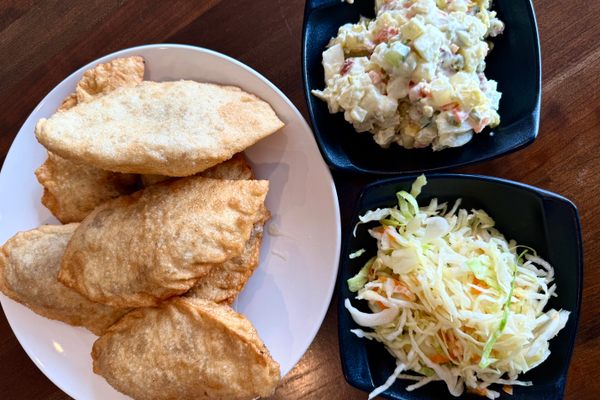About
Beneath a long black entrance canopy on San Francisco's South Van Ness Avenue stands a large wooden door, with a sign that reads, “You Are Now Leaving the American Sector.” It's the first indication that you're in for something special. Walzwerk might be the only restaurant in the United States serving up cuisine of the former East Germany, and, at 20 years and counting, this cozy and compact space remains a portal in time to a place that no longer exists.
Christiane Schmidt, who grew up in the former East German state of Thuringia, owns and runs Walzwerk. The eatery is nothing at all like the typical Bavarian-style beer halls so prevalent throughout the States. Instead, it's an homage to life in the German Democratic Republic (East Germany's official title) before the fall of the Berlin Wall. Framed illustrations of Soviet leader Vladimir Lenin and Communist Manifesto coauthors Karl Marx and Friedrich Engels hang on the wall, and there are small plastic models of Trabants, the iconic GDR vehicle that's been dubbed “one of the worst cars ever made,” displayed beneath the restaurant's tiny, glass-top bar. In the restroom are a series of 45 rpms released by GDR record label Amiga, featuring songs—such as ABBA's “I Do, I Do, I Do, I Do, I Do” and “Western Girl” by East Germany's own Scirocco—that successfully passed censorship. There's even a portrait of Erich Honecker, the former GDR leader who oversaw the construction of the Berlin Wall, hanging prominently above the restaurant's front door.
Much of Walzwerk's cuisine is equally nostalgic, including traditional East German meals such as Thuringian bratwurst with sauerkraut and herring in sour cream—based on Schmidt's own family recipes—and soljanka, a meat-heavy Russian soup that became popular in countries throughout the Eastern Bloc during Soviet rule. The menu also features some concessions to more popular German dishes, such as pork schnitzel, as well as to California palates, such as a stuffed chicken breast served with seasonal vegetables and mashed potatoes. Walzwerk attracts a mix of families, neighborhood residents, and Germanophiles who like to gather for language meet-ups, or simply to immerse themselves in the restaurant's unpretentious and mismatched surroundings.
Update as of July 2020: Walzwerk has permanently closed its doors after 21 years in business.
Related Tags
Know Before You Go
Walzwerk is open evenings only, Tuesday through Sunday. The staff is small—Schmidt herself works the floor three to four nights a week—so if it's a busy night, waiting is part of the experience. Reservations aren't typically needed, but if you'd like to plan ahead, they must be made by phone. Remember, there was no internet in East Germany.
Community Contributors
Added By
Published
October 3, 2019


























